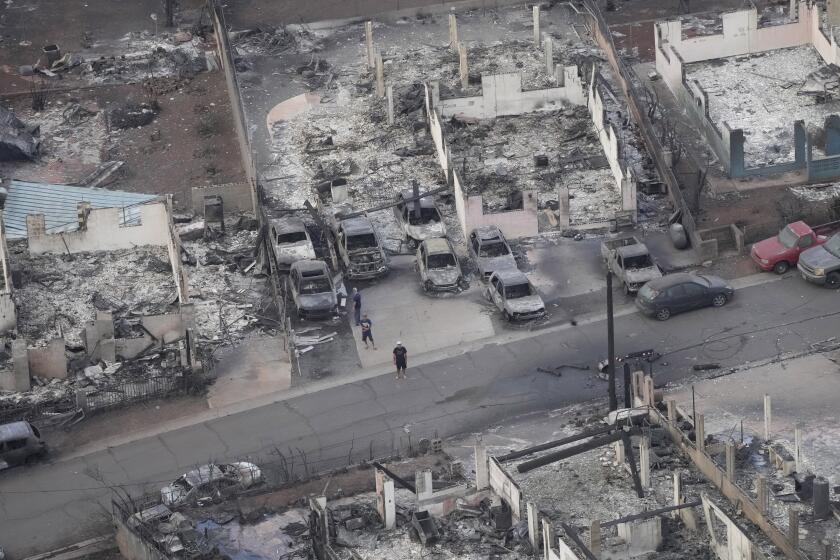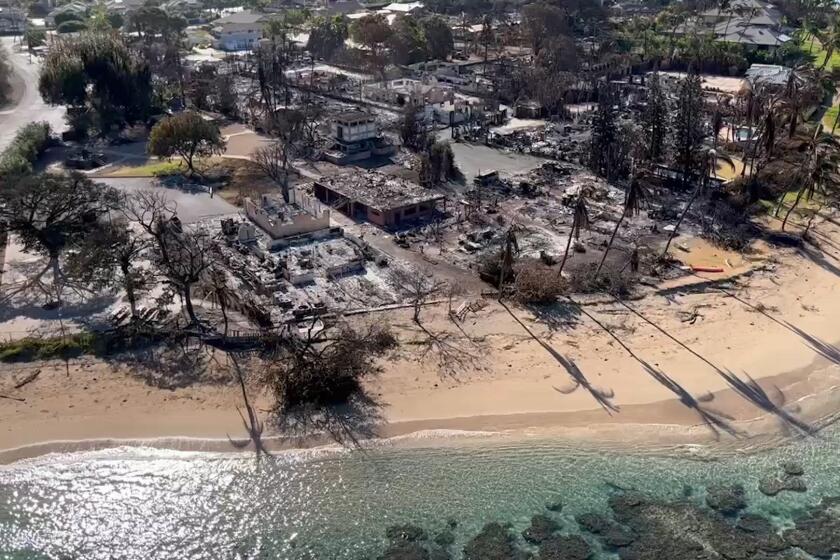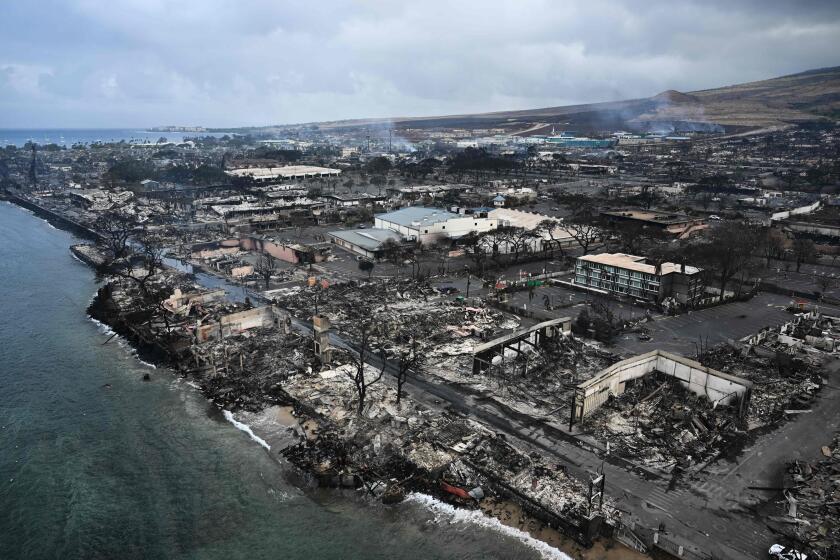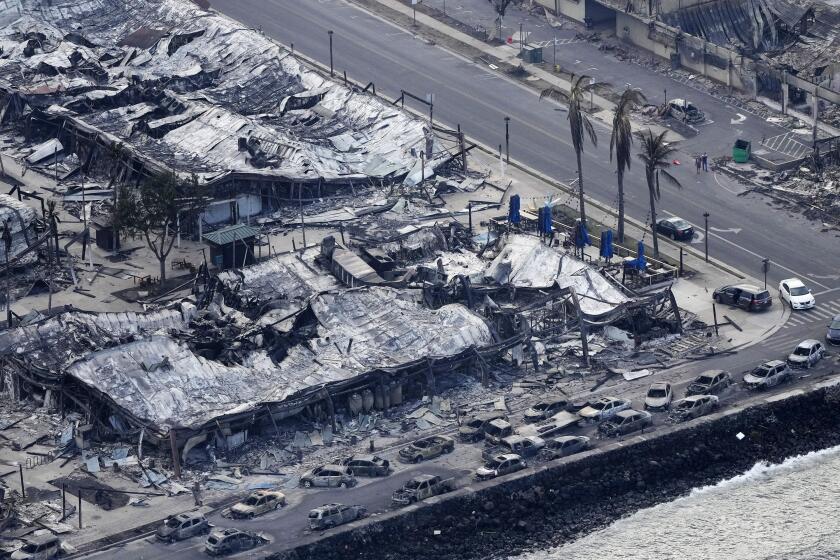Opinion: What Hawai’i needs now from California, our sister state
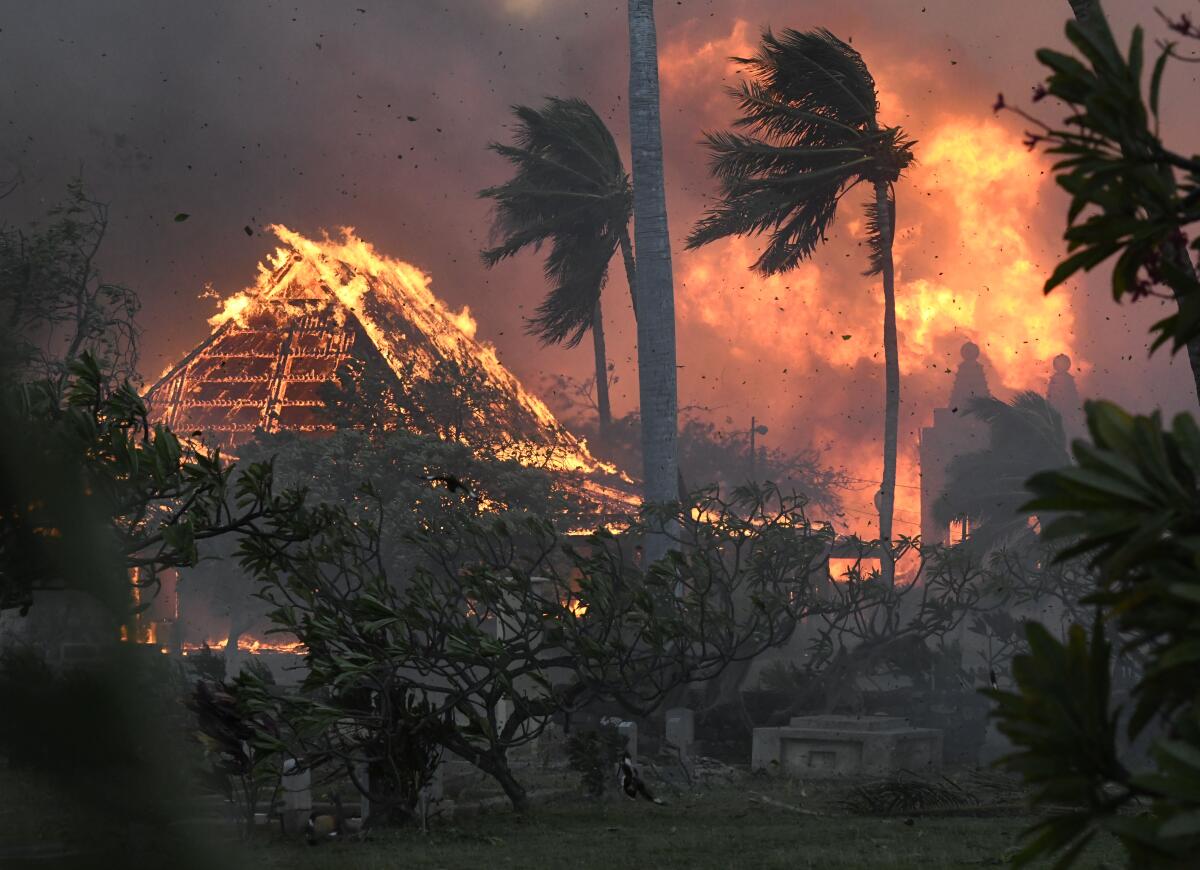
- Share via
KOHALA, Hawai’i — My outrigger paddling crew was somber as we left Kawaihae Harbor at 6 a.m. Thursday.
Normally, we point the canoe toward Haleakala on Maui and paddle toward the 10,000-foot dormant volcano. We’ve been training to cross the Alenuihaha channel that separates Hawai’i Island from Maui next month.
On Thursday morning, Maui was shrouded in clouds and sadness. We barely paid attention to the freshly scorched and still-smoldering acres on our coastline.
Wildfires on the Hawaiian island of Maui have killed at least 36 people, displaced thousands of residents and destroyed hundreds of structures, including homes, businesses and a school, prompting President Biden to declare a “major disaster.”
It was a quiet paddle because we had all gone to sleep with the news that the mayor’s office on Maui said 36 people had died after wildfires swept across his island and destroyed much of the town of Lahaina. By late Thursday, the death toll reached 53.
After we returned to the harbor and stored the six-person canoe, we went to help our fellow islanders and check in on those with close ties to Maui.
A Maui tourist hub looks like a wasteland, with homes and entire blocks reduced to ashes in one of the deadliest U.S. blazes in recent years.
Californians are sadly well-versed in the horrors of wildfires. The people on Maui are not, and Hawai’i is now unexpectedly the site of the second-deadliest wildfire in the United States this century.
As Lt. Gov. Sylvia Luke said Wednesday night, Hawai’i was unprepared for what happened on Maui. Hawai’i has dealt with volcanoes, tsunamis and hurricanes, but this disaster has left Hawai’i numb and uncertain.
The initial death toll of six people was terrible, and the increasing loss of life with each new report is even more difficult to contemplate.
Fires across Maui have destroyed buildings and lead to at least six deaths. Photos from space show the scale of the destruction.
Our island communities are resilient, but not bounce-back-immediately resilient. Californians know how remote we are. You’re our closest neighbors, though a flight out here still takes several hours.
The fires are still raging, and this tragedy feels very much like a tipping point.
A couple weeks ago, as Hurricane Calvin took aim at us, we gathered up our supplies and prepared for possible outages. When Calvin glanced to the south and missed the islands, local officials considered it a drill.
When Hurricane Dora passed several hundred miles south we weren’t too concerned. However, it was a Category 4 and it pulled in dramatic winds across the islands. We are used to winds here. In fact, the mascot of my son’s school is Kamakani, the Hawaiian name of a strong wind.
Wind-whipped wildfires raced through the heart of the island of Maui, killing 53 people, forcing evacuations and gutting much of the historic town of Lahaina.
In my journalism career, I’ve covered many events that left audiences asking: “How can we help?” In this case, I think the help Hawai’i needs from Californians is a smart reset in our relationship.
Californians have suffered from the rest of the country thinking that California is an escapist paradise. The allure of life on the Pacific Coast has brought happiness to millions of transplants seeking the California Dream.
Here in Hawai’i, we deal with the same issues that confound you: affordable housing, the impacts of climate change and inequality. However, since we are so much smaller and an archipelago, we have smaller margins. To escape the wildfires in Lahaina, people were forced into the ocean. We don’t have a lot of room to make mistakes here.
Hawai’i has been marketed to Californians as more paradisiacal than the paradise they already live in. The glossy marketing for second and vacation homes, many of which sit vacant most of the year, has been effectively encouraging Californians to come here to escape the issues California confronts.
As the fires on Maui have demonstrated, Hawai’i doesn’t offer an escape from the problems elsewhere.
Some of the marketing message is accurate: Hawai’i is wonderful. And it’s alluring. However, the marketing leaves out the message that Hawai’i is the ancestral homeland of Native Hawaiians.
The influx of transplants to Hawai’i over the decades has led to the situation where more people of Native Hawaiian ancestry now live outside Hawai’i than live in Hawai’i. The Council for Native Hawaiian Advancement, for instance, held its convention in Las Vegas this summer.
This has led to an identity crisis for Hawai’i. Is Hawai’i Hawai’i without Native Hawaiians?
A travel influencer, Lexi Matejeck, wrote last week in Insider about her regret after moving from Florida to Hawai’i. She said it was difficult to watch how tourists and non-natives acted in Hawai’i.
“It’s not just a trendy place to show off your glamorous beach life — it’s someone’s land. Personally, I also learned that the problems I had back in Florida didn’t magically disappear when I moved,” she wrote. “So even though I tried hard to educate myself, volunteer, and give back, I knew it was best for me to leave. And I now know I only want to be in places where my presence is beneficial.”
Disasters here cause real estate markets to turn upside down. Zoomers being able to work from here has kept our housing costs high.
This spring, at an invitation-only meeting with the mayor of Hawai’i Island at a resort with many part-time residents from the West Coast, a woman stood up to say that she had supported the mayor because she knew he wouldn’t raise her taxes. This sentiment hurts our islands.
I’m fearful that this horrible fire is going to push more Hawaiians out of Hawai’i. While we love our California cousins, we hope you resist the marketing and help deflect Hawai’i from this course that keeps us in a state of crisis.
Naka Nathaniel is a columnist for Honolulu Civil Beat.
More to Read
A cure for the common opinion
Get thought-provoking perspectives with our weekly newsletter.
You may occasionally receive promotional content from the Los Angeles Times.
